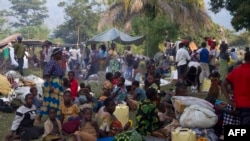The United Nations Refugee Agency, UNHCR, fears for the welfare of tens of thousands of refugees who have fled new violence in the Democratic Republic of Congo’s North Kivu region.
They have moved to western Uganda’s Bundibugyo district and are spread out along the hilly border areas where conditions are tough and access is difficult.
Mohammed Ader, a UNHCR spokesperson for Uganda, said refugees from North Kivu have been arriving for the past 18 months. But, he said the new influx of people into the border region which began on July 11 is an entirely new situation in the Bundibugyo area.
“The displacement is largely the result of a Uganda rebel force fighting the government itself. So in the last five days, over 6,000 refugees were registered on the border area. Most of them are women and children. They left in a hurry and carry very little with them,” said Ader, who explained that the families are living in schools, churches, public buildings, and even out in the open.
He said this dangerous situation has prompted the UNHCR to begin transporting people to one of their transit centers. But, Adler said it’s a difficult process.
“There was initially reluctance from the people to move. They left homes standing, and this is the harvest season in that part of the country, and they were reluctant to go far because they hoped that the fighting would die down and they would be able to go back home,” said Ader. He added there actually has been quite a lot of movement back and forth from their homes.
“People going back in the morning, picking up things from their farms and homes, and coming back to Uganda in the afternoon to spend the night in the safety of Uganda. But now, gradually I think they are deciding now to go to the transit center. Since yesterday, I think we moved about 3,000 people, and I understand we expect that number to reach 10,000, I think in the next 24 hours,” added Ader.
In addition to security concerns, there is also the possibility of an outbreak of diseases. Ader said the refugees are coming from an area that had endemic cholera, and with large populations of people living together there is the possibility of the disease spreading. It’s all the more reason, he said, why it is so important to move people out of the border areas -- which are not meant to house people for any length of time, and into the transit centers.
They have moved to western Uganda’s Bundibugyo district and are spread out along the hilly border areas where conditions are tough and access is difficult.
Mohammed Ader, a UNHCR spokesperson for Uganda, said refugees from North Kivu have been arriving for the past 18 months. But, he said the new influx of people into the border region which began on July 11 is an entirely new situation in the Bundibugyo area.
“The displacement is largely the result of a Uganda rebel force fighting the government itself. So in the last five days, over 6,000 refugees were registered on the border area. Most of them are women and children. They left in a hurry and carry very little with them,” said Ader, who explained that the families are living in schools, churches, public buildings, and even out in the open.
He said this dangerous situation has prompted the UNHCR to begin transporting people to one of their transit centers. But, Adler said it’s a difficult process.
“There was initially reluctance from the people to move. They left homes standing, and this is the harvest season in that part of the country, and they were reluctant to go far because they hoped that the fighting would die down and they would be able to go back home,” said Ader. He added there actually has been quite a lot of movement back and forth from their homes.
“People going back in the morning, picking up things from their farms and homes, and coming back to Uganda in the afternoon to spend the night in the safety of Uganda. But now, gradually I think they are deciding now to go to the transit center. Since yesterday, I think we moved about 3,000 people, and I understand we expect that number to reach 10,000, I think in the next 24 hours,” added Ader.
In addition to security concerns, there is also the possibility of an outbreak of diseases. Ader said the refugees are coming from an area that had endemic cholera, and with large populations of people living together there is the possibility of the disease spreading. It’s all the more reason, he said, why it is so important to move people out of the border areas -- which are not meant to house people for any length of time, and into the transit centers.











